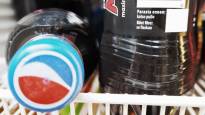The Ukrainian agency added Pepsico to its “war sponsor list” and urges the Finnish manufacturer of Pepsi to end cooperation with the soft drink giant.
Ukraine’s anti-corruption agency accuses Finnish soft drink manufacturer Hartwall of accepting Russia’s war of aggression.
At the beginning of September, the Ukrainian state agency NACP added Pepsico to its portfolio to the list of “war sponsors”.. Hartwall manufactures and distributes Pepsi and the soft drink giant’s other products in Finland.
– If they consider themselves a responsible company and condemn Russia’s war against Ukraine, they should end their partnership with Pepsi, says the head of NACP’s unit responsible for corruption risks and sanctions policy by phone to Yelle Agiya Zagrebelska.
Hartwall barely commented on the matter
Hartwall did not comment on ‘s claims that its cooperation with Pepsico would mean accepting Russian aggression in Ukraine.
In its short email reply, however, Hartwall communicates that it manufactures Pepsico beverage products at its own factory in Lahti only for the Finnish market, and does not procure any raw materials or packaging materials from Russia.
According to Zagrebelska, the Finnish company should cut off its relationship with Pepsico and thus pressure the US company to give up the Russian market.
– Pepsico’s management team only makes a decision to leave Russia if it realizes that it will have a negative impact on the rest of the business, says Zagrebelska.
Hartwall says on its website that it makes responsible choices easy and influences the entire Finnish society.
Pepsi didn’t even leave Russia
According to the Ukrainian Agency, the international companies listed as “war sponsors” blatantly support the Russian military economy.
For example, Pepsico has strongly increased its business in Russia, despite the fact that the company said it would stop production in the country shortly after Russia started its war of aggression in February of last year.
Pepsico has resumed manufacturing Pepsi, 7up and Mirinda drinks under new brand names intended for the Russian market. In addition, the company has launched a completely new soft drink for Russian consumers.
Pepsico has 19 factories in Russia. According to NACP, they directly or indirectly employ around 60,000 people.
The Ukrainian agency also says that PepsiCo Lay’s chips have been found in Russian soldiers’ snack packs. Hartwall is also responsible for their import to Finland.
“War sponsors” pay a “war tax”
The companies on the boycott list are supported by the president of Ukraine Vladimir Putin administration with tax revenues. The NACP agency has calculated that Pepsico paid more than one hundred million euros worth of taxes to the Russian state last year.
In addition to other taxation, foreign companies operating in Russia also have to pay a new, so-called “war tax”.
– If Western companies would completely leave Russia, the war would end briefly. Russia would not be able to keep its economy afloat without the support of these companies, says Zagrebelska.
Zagrebelska points out that international companies are also obliged to support the war of aggression by other means. For example, they must pass on the information of their employees to the authorities for possible recruitment into the war.
Getting on the list has led to boycotts
Many large international companies are on the boycott list. In addition to Pepsico, the latest additions to the list include candy manufacturer Mars, online store Aliexpress and alcohol company Bacardi.
In the past, for example, Mondelez, which produces Marabou chocolate, ended up as a “war sponsor” led to extensive boycotts in Sweden.
The purpose of the list is to increase the damage to the reputation of foreign companies still operating in Russia, so that when social pressure increases, they will leave the Russian market completely
NACP is currently considering adding about fifty new large companies as “war sponsors”. Among them is also The Coca-Cola Company, whose partner company has also continued its operations in Russia.
– More than a year and a half has already passed since the start of the major attack. It means that these companies have made a conscious decision to stay in Russia, says Zagrebelska.
What thoughts did the story evoke? You can discuss the topic on 6.9. until 11 p.m.
